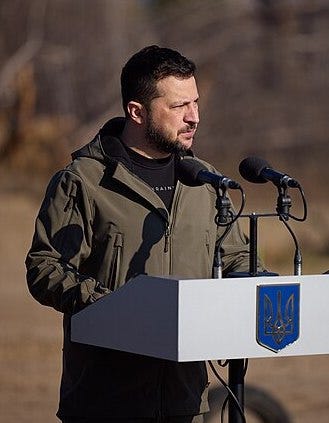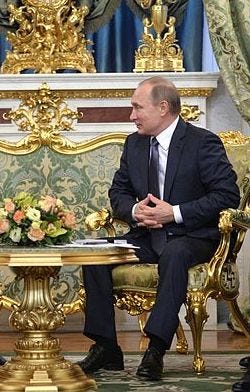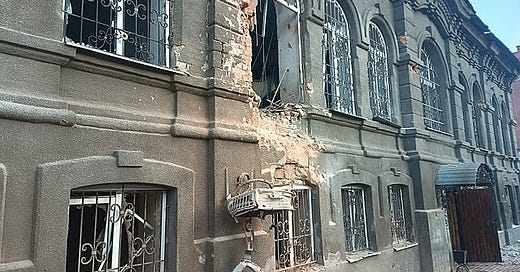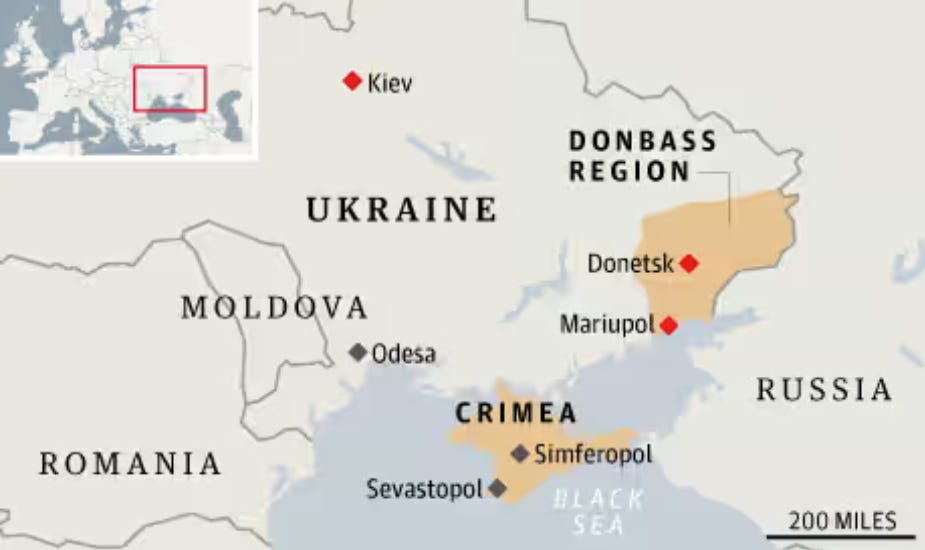A Primer of the Ukraine War
Two wars destroyed Biden's presidency. Here's a brief account of the first one.
The Fall of One Empire
I moved to Prague in the Czech Republic a few years after the Soviet Union fell, and landed a job teaching English. Four days a month I would ride a bus full of adult workers from Prague to an institut in little town called Zruč nad Sázavou where for six hours a day I taught English conversation to employees of Czech Telecom. Often I drank pivo with them afterwards in the local pub. I was the conversation teacher so my job was to keep them talking and I would bait them into sharing personal stories of families, jobs, school, music— anything I could think of. In the process I learned a lot about life under the Soviet Regime.
Which brings us to Ukraine and the war. Ukraine is far from Prague, I never visited it, and I claim no expertise, but I’ve been curious and grateful enough about the region to pay attention when I was there and read a lot since I came back. I know enough to know what I don’t know and the way that war has been reported is appalling.
Soviet Aftermath
Soviet governments—including the Eastern bloc countries “liberated” after WWII— nationalized all major businesses and industries. So 80 years later in the U.S.S.R., and 50 years later in the rest of the Eastern Bloc, when new governments wanted to switch to market economies, they turned to the Western experts who advised them to sell off everything wholesale. The sooner they could get those state assets into private hands the sooner the markets would work their wealth-building magic and transform the gray, dreary lands into sparkly fonts of Western consumer riches and happiness.
But these countries had no living memory of privatizing anything—nor did any government on the planet have the experience, skill, or policies to privatize everything so rapidly. It led to a lot of chaos and jaw-dropping corruption.
A Czech friend of mine for example just out of college with a liberal arts degree was hired to sell off subdivisions of a utility company. She was given no instructions beyond the rule that sales must go to Czechs. She told me the man with the job before her blatantly sold to whomever gave him the biggest gifts. That wasn’t illegal. In fact, he felt it would be unfair not to. Aren’t those markets too?
Yet the selling—crazy as it was—wasn’t half as crazy as the buying, because the only people in those societies who had money to buy companies were (1) former members of the communist party who had embezzled funds (because no one was ever officially paid a lot), (2) people with connections to organized crime, and (3) people hired as fronts for foreign capital. So in every former Soviet country people from those three groups ended up owning telephone companies, banks, power companies, media, factories, and everything else. Ever after they could skim money from everything people did.
Throughout the Eastern Bloc this new super-rich class of wealth-skimmers became known as the Oligarchs. They were somewhat like private equity in the U.S. but their growth was much faster and more public. And even more than private equity the oligarchs owned the post-Communist politicians. There just weren’t many other sources of power to compete with them. Often the oligarchs themselves became the post-Communist politicians. Figures like Donald Trump and Elon Musk (or Mike Bloomberg, Mitt Romney, and Mark Cuban) were everywhere in the post-Soviet world.
The Ukraine(s)
Oligarchs usually split into factions based on personalities and self-interest but in Ukraine there was another factor. Oligarchs in the West of the country often spoke Ukrainian and had business and financial ties to Europe, while oligarchs in the East had business and financial ties to Russia and sometimes didn’t speak Ukrainian at all. (The Russian language had been used throughout the U.S.S.R.)
Like its oligarchs, Ukraine itself was linguistically and economically split. The districts along the Russian border—called Donbas or Donbass—and the Crimean peninsula were majority Russian-speaking. Both had voted overwhelmingly to join the newly-sovereign Ukraine when the U.S.S.R. broke up, but they did so under the presumption that they would be allowed a degree of regional autonomy, and at the very least would be allowed to speak and conduct public business in the Russian language. These areas depended heavily on Russia economically, the ports of Crimea and the mining and heavy industry of Donbas.
Euromaidan
The fights between pro-European and pro-Russian oligarchs first peaked in Ukraine’s 2004 “Orange Revolution.” It was an uprising with public protests leading to leadership changes somewhat like the public protests that brought down the former Soviet governments. But the Orange Revolution didn’t settle anything; it only left the country more split between pro-Russians and pro-Europeans with attitudes hardened all around.
In 2010 Viktor Yanukovych, a career politician, Russian-speaker, and non-oligarch, beat pro-Western Ukrainian-speaker and banking oligarch, Viktor Yuschenko in what was probably a fair election by the standards of the former Soviet bloc, and assumed the presidency.
Yanukovych tried to maintain good relations with both Europe and Russia, but after a bidding war of carrots and sticks by Europe and Russia he opted to side with Russia. (That’s probably where his heart was anyway.) Yanukovych leased Crimean ports to Russia for its Black Sea Fleet in exchange for discounted Russian natural gas and a $15bn economic bailout from Moscow.
This was a better deal than Europe offered, and was certainly good for the economy—at least in the short term—but the pro-European Ukrainians felt betrayed. (Pro-European oligarchs were especially frustrated since this cost them money as well as cultural ties.)
A new wave of protests began in late 2013 in Kiev’s Maidan Square. Police repression only egged them on until the protests grew and spread throughout the country. Finally, in early 2014 Yanukovych and the ruling party stepped down and fled abroad. This upheaval was called the “Euromaidan.”
Petro Poroshenko—a pro-European oligarch who made his fortune in cars, shipyards, media, and chocolate—had given financial support to the protestors and won the 2014 election, declaring the Donbas separatists no better than Somali pirates and promising to win back Crimea by war if needed.
The Russian Perspective
For most of the West, and the Ukrainians oriented toward them, all this was justice and progress. They associated Russia with the Soviet Union and the horrors Ukraine suffered under it.1 The promotion of the Ukrainian language and mass democratic protests recalled the revolutions that had brought down the hated Soviet Union itself. For the pro-European half of Ukraine hope was in the air.
But Russia’s Vladimir Putin didn’t see it that way. Putin had started his third term as president of the Russian Federation after four years out of office. In his first two terms he had tamed the Russian oligarchs and beaten all his rivals with a mixture of politics, jail terms, threats, and allegedly assassinations. Economically he had pulled Russia from the abyss (so his supporters claimed) or at least been in charge when it pulled itself from the abyss (as his critics claimed). In either case few in the West realize how deep the abyss had been for the Russian people. The shock capitalism imposed with the “help” of Western “experts” devastated Russia, causing shortened lifespans, pervasive drug and alcohol abuse, deaths of despair, and grinding poverty.
The oligarchs thought the good in all this (their wealth) outweighed the bad (everyone else’s suffering), but Putin disagreed—He was a stodgy patriotic nationalist—and he blamed everything firmly on the United States. Furthermore, Putin considered the situation not only humiliating and demoralizing but ongoing. After all, U.S. presidents and diplomats since the Soviet collapse had promised not to extend NATO to the Russian border, but NATO kept expanding.2 Also, when the U.S.S.R. had broken up the three largest soviet republics of Russia, Byelarus, and Ukraine had agreed to ongoing ties. All three had been the core of the both the U.S.S.R., and the earlier empires of the Czars, and Ukraine was trying to opt out. Public promises weren’t binding legal treaties but they were supposed to mean something. It shocked Putin that now Europe, the U.S., and Ukraine openly talked of bringing Ukraine into NATO and the European Union. When Putin tried to put those former promises into new international agreements, when he tried to tell the world Russia couldn’t not abide the direction events were taking, the world didn’t listen or care. Putin believed that this was because Russia was weak so what Putin or Russia wanted didn’t matter. The West didn’t care about anything but it’s own power.
In Putin’s eyes—and he was a former KGB liaison in Germany—the Euromaidan and the “Color Revolutions” were entirely CIA-sponsored coups, pure and simple.3 Like the U.S.-sponsored coups that had overthrown governments in Iran, Central America, and elsewhere since the 1950s, the U.S. had just done what it wanted and called it justice. Yanukovych had been a legitimately elected president who had accepted a deal with Russia because Russia offered better terms. So the U.S. and its European lackeys had driven him from power with a fake populist revolt. And Putin, the history buff, considered Ukrainian nationalism an utter fiction. Kiev was the original capital of Czarist Russia. Russians and Ukrainians were ethnic brothers. There was not really any such ethnicity as “Ukrainian.”
While Putin’s emotions may have been reactive, his allegations unproven, and his history fanciful, his policies would be coldly pragmatic. His government immediately annexed Crimea—leases and treaties be damned—and he began to arm pro-Russian separatists in the Donbas region. These groups quickly defeated regular Ukrainian military units. When a new anti-Russian, ultra-nationalist militia, the Azov Brigade, formed and blocked the separatist advances, Putin saw it as being inspired by Nazi collaborationist groups in WWII. How else to explain ultra-nationalism among people who weren’t really a people?
Minsk I & II
With Crimea under Russia’s control—and that’s what mattered strategically for Russia—Putin’s diplomats met with Ukraine’s and managed a deal called the Minsk Protocol to stop the conflict, but no one followed it.
So the diplomats headed back to Minsk in 2015 where they negotiated Minsk II. This was a complicated agreement calling for local self-determination, but it wasn’t clear how or when. Donbas separatists called their own election which they promised to run according to Ukranian law, but President Poroshenko criticized this as premature since Ukraine itself should oversee the election. Putin pressured the separatists to put off elections and so elections were put off and off until 2018, and by then non-Russian speakers—at least the civilians—had already fled the region, so in the Ukrainian government’s eyes the regional elections didn’t settle much.
National elections did, however. In 2019 Poroshenko lost the presidency to Volodymyr Zelenskyy, a television comedian whose only political experience was playing a fictional Ukrainian president on TV. Zelenskyy’s campaign promised to fight corruption and resolve the conflict with Russia, but Putin never seems to have taken Zelenskyy seriously.
Russian-sympathizing accounts claim that under assurances from the U.S. Zelenskyy didn’t follow through on Minsk II obligations; Putin became convinced that due to U.S. pressure all negotiations on were intended to stall while Ukraine secretly prepared to join NATO.
Special Military Operation
In the spring of 2021 Russia massed on the border and demanded that the West formerly ban Ukraine from joining NATO. They demanded formal talks, official actions, and the reworking of international agreements.
Joe Biden and the European leaders offered absolutely nothing.
In February 2022 Russia recognized the independence of two brand-new Donbas republics of Donetsk and Luhansk and invaded. Putin called this a “Special Military Operation” intended to secure their territorial integrity and “de-Nazify” Ukraine.4 Massive street protests in Russia were declared by Putin to be CIA operations, or worse, deluded Russian traitors who had lost their love of the mother country seduced by corrupt Western values.5 Protests were forcibly broken up and any Russian who even dared call the Special Military Operation a war could find himself banned from state media.
In the normal course of Eastern-bloc history the Ukrainian army should have fallen to pieces, a few units might have even switched sides, the Ukrainian president should have fled the country (as Yanukovych had done), and Ukraine would have been brought back into the pro-Russian orbit. But although the Russian army was clearly superior, at least in tanks and artillery, the invasion bogged down, the Ukrainian army rallied, and Zelenskyy, far from fleeing, turned out to be as effective in real-life television drama as he had been at entertainment-only television comedy.
Jaunty President Zelenskyy in camou pants and t-shirts bravely calling for justice, courage, and hope from the streets of war-torn Kiev contrasted sharply with Putin’s legalistic droning in tacky white rooms with oversized tables and gilded chairs. The West fell in love with these new underdogs. Suddenly Kiev became Kyiv! And accordingly to the new defiantly Ukrainian orthography, The Ukraine became just Ukraine and Zelensky became Zelenksyy with an extra -y. Take that Russians!
Europe and the U.S. rallied to support Ukraine against the invading horde, shipping mountains of weapons, bags of money, and banning Russian culture and any Russian artist who didn’t condemn Putin. And the sanctions… the allies couldn’t sanction fast enough. They froze Russian assets, kneecapped Russian currency, blocked Russian exports, choked Russian imports, withdrew corporate chains and brands, and in September the U.S. with Norwegian help apparently blew up two pipelines carrying natural gas to Germany and Western Europe to prevent any possibility of European backsliding.
So the West had good PR and lots more money, but Russia still had a stronger conventional military, and enormous reserves of fossil fuels.
Who would win?
I’m not a military buff, but most of my life I have known military buffs, and most have confidently declared that armies and fuel are real while speeches and money are nothing. But strangely for a long time Ukraine held its own, and could have even won.


The End of the War
The Russian army pulled back from its initial advances with heavy losses in tanks and men; no Ukrainian units switched sides (which I believe Putin was expecting) and in fact Ukrainian morale remained high; many Russians, especially young people, left the country (and Russia already has a declining population); and the Russian economy was hit hard by the sanctions.
But Russia held on to the Donbas and Crimea, and bit by bit found ways to work around sanctions, get its oil and gas sold, and rebuild its economy in a more fine-grained, resilient, and less globally-dependant form.
By 2022 the war was effectively a stalemate. In March both sides met in Istanbul. What happened is still in dispute, but Russia, and many—but not all—on the allied side claim that Russia and Ukraine basically worked out a deal that would allow Ukraine to join the E.U. and work on deals for Crimea, ethnic Russians in Ukraine, and Donbas. Almost all that remained was a meeting between Putin and Zelenskyy. Peace agreeable to both sides was achievable. But then the West pressured Zelenskyy to pull out.6 Needing the West to survive, Zelenskyy either stalled or pulled out completely, depending on accounts.
Then in September a Ukrainian military offensive seemed to be going well, and soon raised their negotiating demands even further. This time they didn’t even seem to need Western pressure.
But then the tide turned at the Battle of Bakhmut with brutal attacks by Russia’s answer to the Azov Brigade, an ultra-nationalist private military unit of their own called the Wagner Group. After this Russia began to advance steadily. Meanwhile Putin had built a new diplomatic alliance structure with Iran and China (and much of the the non-Western world), announced his country’s development of new high tech weapons, and celebrated a growing economy with high consumer confidence and support for the regime. Now it was Russia’s turn to up its negotiating demands.
Since then only the most gimlet-eyed imagine a Ukrainian victory. Ukraine is losing territory steadily, cannot replace its weapons, cannot replace its dead and wounded, and suddenly faces the presidency of Donald Trump presidency, who has promised to end support. Ukraine cannot win and when the peace treaty is signed Russia will get vastly more than they would have dreamed of in Istanbul two and a half years ago. Ukraine faces a national nightmare.
Winners and Losers
Wars are rarely great events for anyone, but this one has hurt everyone to some degree or another.
Not the biggest, but the most clearcut loser has been Germany. Germany’s highly technological and highly profitable post-WWII industry has relied on Russian natural gas. Since the Nordstream pipeline was destroyed, Germany has bled factories—most of it coming to the United States. With a declining population, little ability to culturally absorb immigrants, a stripped industrial sector, and a lack of affordable energy, Germany’s days as a leading economic power are likely over.7
Russia also has a declining population—with high emigration adding to it—and so likely cannot fight another war over the next decade due to losses in Ukraine. Also the goal was to keep NATO from reaching Russia’s border, and now the Baltic countries and Finland and Sweden have joined. Sweden in particular is a major military power even if we don’t think of it that way. Still Russia also gained in this war and a generation from now may well be stronger for it. They held on to Crimea, developed new hypersonic missiles, and created a potentially-workable non-U.S. trade network, BRICS.
Joe Biden. U.S. presidents can get away with any war if citizens are happy at home, but when citizens aren’t happy at home—and Americans aren’t happy at home—foreign wars make leaders look callous, weak, incompetent, and arrogant. Biden has always disliked Putin; his “diplomats” have refused to even talk to their Russian counterparts; he made offers to Ukraine without even consulting Russia, and his foolish administration has encouraged the Ukrainians to fight when they probably had no chance to succeed. Basically, the West supported the war not to help Ukraine but to weaken Russia. Worst of all Biden seems to have blown up major gas pipelines, which should—if there were justice in the world—land him in prison. All of this was monstrous and unforgivable. In the last year this may be part of Biden’s cognitive decline but there’s abundant evidence the anti-Russian belligerence and imperial hubris has always been part of his character.
This was not the beginning and won’t even be the climax of the end for the U.S. Empire. The beginning was the Iraqi War and the end will also be in the Middle East. But Ukraine will be the turning point for much of the world. We can live in a bubble world of American power and prestige, but the rest of the world is not in that bubble. I’ll bet there are a lot of governments in the Baltic and the Caucus questioning their trust in the West. When Ukraine surrenders and signs a humiliating treaty, the U.S. media might pin it all on Trump8 and that might work for the U.S. public, but the rest of the world will know in brutal terms what it means to be a U.S. ally.
The American public was sold another bill of goods, and will become even less trusting of everything. This is was I find so outrageous. The U.S. was not bound to Ukraine by any treaty. There was no reason for the U.S. media to hide the truth about the difficulty of beating Russia in a war, the limits of military power, and the history of NATO expansion. The reality of Putin is bad enough; why was he painted as some sort of Hitler? Why weren’t the legitimate concerns of the Russian people reported? Why was there this idiotic hatefest for all things Russian?
Ukraine will lose everything.
Because of Putin’s approach, Ukraine will be anti-Russian for centuries. Identity is neither fluid nor fixed, it’s rooted in stories that quickly form but erode only slowly. Because of Putin’s actions—and Zelenskyy’s response—most Ukrainian speakers for centuries will think of themselves mostly as part of Europe (with whom they may have fraternal conflicts from time to time) held down by Russia/Asia, rather than mostly a part of Asia (with whom they may have fraternal conflicts sometimes) held down by Europe. It could have gone either way, but this war cemented Ukrainian identity for the foreseeable future as anti-Russian, and that will impact how all the past is viewed. The Holodomor famine will be seen as persecution by Russia and not by Stalin or by the Soviet system.
The Fall of Another Empire
I grew up in America seeing the Soviet system as our antithesis, but in Prague I began to see it more like a distorted mirror image. The giant ugly buildings in Prague raised to proclaim the spirit of Socialism looked suspiciously like the giant ugly buildings in America raised to proclaim the spirit of Capitalism. The bureaucrats in state economies behaved suspiciously like the bureaucrats of giant corporations. Czech men drinking beer and watching hockey looked a lot like American men drinking beer and watching football.
Most of all, the decline of the U.S. that we see around us—the breakdown of health, media, and social order—brings to mind what I heard and read about the decline of so many post-Soviet societies. Meanwhile our super wealthy business folk more and more resemble Eastern oligarchs. The last three presidential election cycles and the massive public protests of the last decade even display more than a hint of the “Color Revolutions” in the Eastern Bloc. Trump is much more like a post-Soviet strongman than the dictators of 1930s Europe, and Biden is like one of those aging Kremlin politburo fools blind to the coming storm.
That storm isn’t coming from Ukraine, however. The Ukrainians will pay for Biden’s folly with their lives and futures, but that will likely be the end of it. It is Europe, especially Eastern Europe, that will pay the whole price for our imperial folly. Our comeuppance will come from elsewhere. It’s in the Middle East where the dice are bouncing along the felt as we wait to see them land.
Thanks for reading Blame Cannon. Happy Thanksgiving!
The Holodomor was a a famine in the Ukraine in the 1930s under Stalin caused by collectivization of agriculture and forced industrialization, which may have been a deliberate genocide by Stalin to crush the Ukrainian independence movement. 3.5 to 5 million starved.
This was one of the conditions offered by the West to the East to allow for the reunification of Germany.
It’s not clear whether the U.S. simply supported the Maidan protests as they unfolded or engineered them, or probably something in between. The Russian’s most damning evidence of U.S. complicity was a recorded conversation between Asst Secretary of State Nuland and U.S. Ambassador to Ukraine Jeffery Pyatt. Make of it what you will.
Fascism and fascist influence is a problem throughout the former Soviet bloc, including both Ukraine’s ‘Azov Brigades’ and Russia’s ‘Wagner Units’, plus the appeal of philosophers such as Carl Schmitt and Ivan Ilyin and the ridiculous deification of figures like Stepan Bandera. That said, ‘Denazification’–one of Russia’s primary stated war aims–is a bizarre term. Maybe in Russian it means something, but in practice how will that end up as anything but show trials?
Putin particularly abhors LGBT+ prevalence and influence.
Particularly after a surprise visit by Boris Johnson to Kyiv on April 9th.
Germany is not a good place for solar or wind, and its Green Party dismantled its nuclear plants.
When Biden pulled troops out of Afghanistan, a deal Trump negotiated, Trump and his own allies quickly blamed it on Biden.





